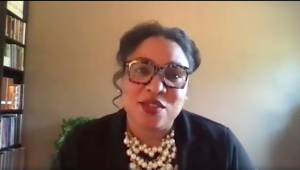 Dr. Tracey Flores and Dr.
Dr. Tracey Flores and Dr.
Dr. Ayanna Cooper is an educational consultant and advocate for culturally and linguistically diverse learners.
"What makes the Black immigrant and refugee experience unique? How does it feel to be a Black immigrant or refugee? How is being African American different from being a Black immigrant or refugee?
Dr. Ayanna Cooper: Black Immigrants in the United States
Dr. Ayanna Cooper is an educational consultant and advocate for culturally and linguistically diverse learners.
Dr. Karen Woodson: Partnering with Indigenous Families
In this video interview, Dr. Karen Woodson talks about some of the ways a school she led partnered with its indigenous families from Central America.
Dr. Karen Woodson is an expert in leadership issues related to English language learners (ELLs).
Dr. Karen Woodson: Partnering with ESOL Educators for Equity
Dr. Karen Woodson discusses the steps she and her school staff took to turn around their high-impact ELL school and create a more equitable, effective model of instruction.
Dr. Karen Woodson: Social-Emotional Support for Students from Central America
Dr. Karen Woodson shares the importance of strong social-emotional support for students, particularly immigrant youth who have experienced trauma.
How can ELL educators sustain their advocacy for their students and themselves during the COVID-19 pandemic? One district ESL coach shares some of her lessons learned.




